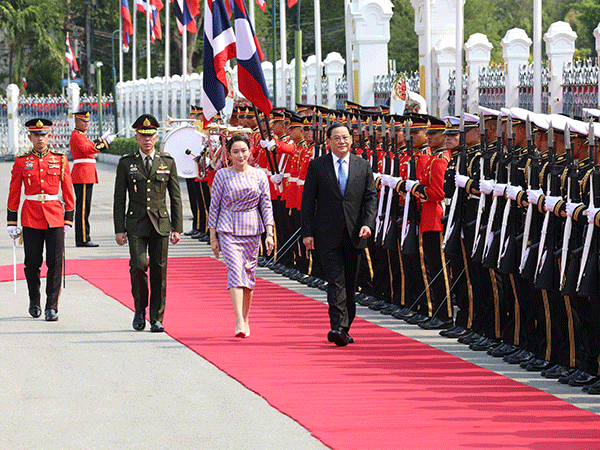Laos, Thailand vow joint effort to broaden economic ties, combat call centre scams and drug trade
The heads of government of Laos and Thailand have agreed to work together to boost trade and investment, improve rail links and logistics systems, and tackle fraudulent call centre operators and the drug trade.
The agreement was reached during bilateral talks between visiting Prime Minister Sonexay Siphandone and his Thai counterpart Paetongtarn Shinawatra.
PM Sonexay and his delegation arrived in the Kingdom on Thursday for an official visit at the invitation of Mrs Paetongtarn, aiming to cement the Strategic Partnership for Growth and Sustainable Development, the Lao Ministry of Foreign Affairs said in a press release.
 |
Prime Minister Sonexay Siphandone and his Thai counterpart Paetongtarn Shinawatra inspect a guard of honour.
|
The two PMs witnessed the signing of four cooperation documents covering justice, passenger rail transport, trade, and investment promotion.
“Prime Minister Sonexay and I discussed our desire to accelerate cooperation momentum between Thailand and Laos for mutual progress and promote the wellbeing of our peoples,” PM Paetongtarn told a joint press conference held shortly after the meeting.
The two sides agreed to strengthen cooperation in tackling call centre fraud groups – a pressing issue in the region which has made headlines in recent months.
Last year, as many as 1,460 suspects of 16 different nationalities were detained by police at the Golden Triangle Special Economic Zone in Laos’ northwestern Bokeo province, which shares borders with Thailand and Myanmar.
It came after police dismantled nine call centre fraud operations, according to a report by the Zone’s public security office.
Earlier this month, Thailand cut its power supply to Tachileik district in Myanmar’s Shan State, while Laos restricted electricity transmitted to the district with the intention of paralysing call centre operations there.
In a video clip of the joint press conference posted on the Thai government’s website, PM Paetongtarn said she proposed to address the issue through the Mekong-Lancang cooperation framework. The regional bloc comprises Cambodia, Laos, Myanmar, Vietnam, Thailand and China, with Thailand assuming the chairmanship this year.
“I admire the Lao government for conducting operations to suppress crimes in the Golden Triangle Special Economic Zone,” she said, adding that Thailand stands ready to offer support.
Regarding economic cooperation, the two prime ministers agreed to strive to increase the value of bilateral trade to US$11 billion by 2027, up from just over US$6 billion at present.
PM Paetongtarn thanked the Lao side for facilitating the transport of Thai farm products to China via the Laos-China railway.
The meeting noted the progress made in improving transport links, including the planned opening of the fifth Mekong Friendship Bridge, which links Laos’ Borikhamxay and Thailand’s Bueng Kan provinces, at the end of this year.
Looking ahead, “Prime Minister Sonexay and I agreed that our two countries will jointly develop a logistics system strategy,” she told the media.
Talks expressed support for transport projects in the plan, including construction of a second Mekong Friendship Bridge linking the Lao capital Vientiane with Nong Khai, particularly to facilitate rail links. Construction is expected to start next year and be complete in 2029.
PM Paetongtarn said she proposed convening a tripartite meeting (China, Laos and Thailand) to push forward the plan to link the high-speed Laos-China and Thailand-China railways.
“In addition, we agreed on the need to create a joint venture among the Thai and Lao private (sectors) to manage and operate regional transport and logistics,” she said.
The Thai PM also announced the offer of 75 scholarships for Lao nationals, marking the 75th anniversary of diplomatic ties between the two countries this year.
Talks also touched on linking databases and early warning systems in a bid to efficiently address the problem of transboundary haze pollution.
The two sides agreed to jointly do more to maintain security along their countries’ shared border. They also pledged to step up cooperation to combat the drug trade by encouraging information sharing and intensifying investigations, while promoting the cultivation of alternative crops to replace drug production.
For his part, PM Sonexay expressed agreement with his Thai counterpart’s statement and said he highly valued the outcomes of the talks.
The Lao PM, who was on his first official visit to Thailand after assuming the premiership role, added that he proposed the Thai side to consider extending Phase II of the Laos-Thailand-Malaysia-Singapore (LTMS) power integration project.
The LTMS was signed in 2022, under which Phase I saw Laos export 100MW of electricity to Singapore via Thailand and Malaysia. Phase II was delayed due to disagreements over the quantity of power to be purchased, according to Reuters.
The two PMs’ talks also agreed on the need to improve and construct additional power grid networks to enable increased power supplies.
To pursue the targeted increased trade value, the Lao PM said the two sides agreed to create the factors and conditions necessary to boost trade and investment and enhance connectivity.
On the same day, a Laos-Thailand business forum took place to bolster that effort.
PM Sonexay called for comprehensive welfare support for Lao workers in Thailand – a popular destination for Lao job seekers – and their protection against human trafficking.
He expressed heartfelt gratitude to the government and people of Thailand for the assistance and support extended to Laos over past years.
By Souksakhone Vaenkeo
(Latest Update February 21, 2025)
|


